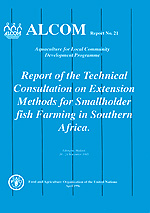 | ALCOM GCP/INT/555/SWE
Aquaculture for Local Community Development Programme GCP/RAF/277/BEL
TCP/RAF/2380
ALCOM Report No. 21
Report of the
Technical Consultation on Extension Methods for Smallholder Fish Farming in Southern Africa
Lilongwe, Malawi
20–24 November 1995
by
Henk van der Mheen
Aquaculturist
ALCOM
Funding Agencies:
SWEDISH INTERNATIONAL DEVELOPMENT AUTHORITY
BELGIAN ADMINISTRATION FOR DEVELOPMENT CO-OPERATION
Executing Agency:
FOOD AND AGRICULTURE ORGANIZATION OF THE UNITED NATIONS
Harare, Zimbabwe, February 1996
|
| The designations employed and the presentation of the material in
this publication do not imply the expression of any opinion
whatsoever on the part of the Food and Agriculture Organization of
the United Nations concerning the legal status of any country,
territory, city or area or of its authorities, or concerning the
delimitation of its frontiers or boundaries. |
Preface
This document reports on the discussions and decisions resulting from a Technical
Consultation on Extension Methods for Smallholder Fish Farming in Southern Africa. It
was organised by ALCOM, the “Aquaculture for Local Community Development
Programme” which is financed by Sweden, Belgium, FAO and the member countries of
SADC (Southern African Development Community).
The consultation was held 20–24 November 1995 in Lilongwe, Malawi, and was attended
by 37 participants from within and outside the region.
The objective of the consultation was to improve the understanding and prioritize the
issues of integrated aquaculture extension aimed at smallholder farmers, for use by
extension planners and managers in Southern Africa.
The document summarizes the proceedings of the consultation's three sessions. It contains
the findings and recommendations of three working groups, and the extended abstracts of
the papers presented during the consultation.
ALCOM is a regional aquaculture and fisheries programme of the FAO (Food and
Agriculture Organization of the United Nations). It is based in Harare, Zimbabwe and
covers all the SADC countries. The aim of ALCOM is to assist member countries to
improve the living standards of rural populations through the practice of aquaculture.
Towards this end, pilot activities are conducted in member countries to demonstrate new
ideas, techniques and methodologies. Successes achieved, ideas derived, lessons learned,
are applied on a wider scale by member governments.
| Abstract |
| The Technical Consultation on Extension Methods for Smallholder Fish Farming in
Southern Africa was organised by ALCOM, and was held from 20 November to 24
November 1995 in Lilongwe, Malawi, and was attended by 37 participants from
within and outside the region. |
| This report summarizes the proceedings of the consultations sessions on “The
integrated extension approach” and “Aquaculture extension experiences”. The
findings and recommendation of the three working groups on “Integration of
aquaculture into agriculture extension services”, “Delivery mechanisms: the role
and use of farmer to farmer and institutional extension mechanisms in aquaculture
development” and “Aquaculture research-extension linkages” are given. Extended
abstracts of 15 papers presented during the consultation are reproduced. |
| The participants of the consultation agreed that for the development of aquaculture,
aquaculture should become part of the agriculture extension. At the same time it
was necessary for the agriculture extension service to undergo an important
conceptual change in set up and approach. The approach should put much more
emphasis on assisting farmers in the process of problem solving and decision
making. The monitoring and evaluation of the service should be carried out in
participation with the farming community. |
| The organisation of the extension service should become much less top down in the
sense that a promotion meant a move further away from the farmers. Instead of a
hierarchical set up farmers, field extension workers, supervisors and researcher
should operate on a basis of equal footing. They should also jointly decide on the
research to be carried out. |
| The extension workers in the field would have to change from those who only
transfers technology to staff who could assist farmers in analyzing their situation
and in making decisions on how to solve problems. The extensionist has to be
practically oriented with good analytical skills who can adapt agriculture
technology to the local situation of the farmers. |
| The involvement of local extension staff or motivators should be encouraged, and
information should be channelled through existing media at village level. The
selection of the motivators was considered of crucial importance for the success of
this approach. |
Introduction
Opening
Overview
Session 1: The Integrated Extension Approach
Session 2: Aquaculture Extension Experiences
Session 3: Findings and Recommendations of the Working Groups
Group 1: Integration of Aquaculture into Agriculture Extension Services
Group 2: Delivery Mechanisms: The Role and Use of Farmer-to-Farmers and Institutional Extension Mechanism in Aquaculture Development
Group 3: Aquaculture Research and Extension Linkages
Session 5: Presentation and Discussion of Working Group Reports
Concluding remarks
Appendix 1: List of Participants
Appendix 2: Programme
Appendix 3: List of Documents
Appendix 4: Extended Abstracts
How to Order
